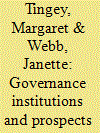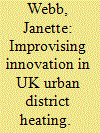|
|
|
Sort Order |
|
|
|
Items / Page
|
|
|
|
|
|
|
| Srl | Item |
| 1 |
ID:
171395


|
|
|
|
|
| Summary/Abstract |
Energy Efficient Scotland (EES) is the Scottish Government's flagship programme for the national-scale retrofitting of buildings over the next 15–20 years. This is a critical component of Scotland's commitment to net zero greenhouse gas emissions by 2045, that will also help to reduce fuel poverty and improve local economies. The success of EES is reliant on partnerships between local authorities, arms-length external organisations, charities, and social enterprises. However, little is known about how these organisations collaborate for the delivery of building retrofit. This paper analyses interview data from local authorities and these delivery partners, conceptualising them as part of linked ecologies, or interconnected networks of professional groups. EES is identified as a hinge that holds distinct meanings for different parties; it supports learning between local authorities and delivery partners, but does not guarantee the alignment of priorities. The concept of avatars, or individuals and skills that travel between organisations, reveals the search for relevant internal knowledge amongst local authority officers, whilst external delivery partners amass expertise for retrofitting. To ensure successful national-scale building retrofit, policy makers will need to develop shared databases, and clear guidance for the allocation and distribution of resources and responsibilities between local authorities and delivery partners.
|
|
|
|
|
|
|
|
|
|
|
|
|
|
|
|
| 2 |
ID:
171526


|
|
|
|
|
| Summary/Abstract |
UK Local Authorities are increasingly declaring ‘climate emergencies’ and pledging 100% clean energy and carbon neutrality ambitions for their locality, despite lack of powers over energy systems. Our research investigates current Local Authority engagement in clean energy, and considers prospects for meso-scale innovation. The analysis allocates Local Authorities to one of four categories of engagement, from energy ‘laggards’ through to ‘leaders’, based on their energy plans and investments. Findings reveal that, despite lack of direct powers, a high proportion of Local Authorities have developed sustainable energy plans and projects, but only a minority manage to combine these into a more strategic local programme. There was proportionately greater activity in Scotland and considerable variation was found across English regions. We conclude that variation in levels of engagement relates to authority size and divisions of responsibilities between different levels of government. The capacity for Local Authority-mediated social innovation to support development of a clean UK energy system is discussed. Implications for policy include the need for a statutory power, and commensurate resources, for Local Authorities, to ensure a more comprehensive and systematic contribution to clean energy innovation.
|
|
|
|
|
|
|
|
|
|
|
|
|
|
|
|
| 3 |
ID:
137720


|
|
|
|
|
| Summary/Abstract |
Research on district heating has focused on technical-economic appraisal of its contribution to energy and carbon saving in urban centres. There is however lack of analysis of political and social processes which govern its actual take up. This paper examines these processes through a case study of Aberdeen, Scotland. Interviews and documentary analysis are used to examine the 2002 development of Aberdeen Heat and Power (AHP), an independent energy services company (ESCo). Technical-economic feasibility was a necessary component of appraisal, but not sufficient to govern decision-making. In the UK centralised energy market, DH investment is unattractive to commercial investors, and local authorities lack capacity and expertise in energy provision. In Aberdeen, the politics of fuel poverty converged with climate politics, creating an a-typical willingness to innovate through improvisation. The welfare priority resulted in creation of a non-profit locally-owned ESCo, using cost- rather than market-based heat tariffs. AHP has developed three combined heat and power energy centres and heat networks, supplying 34 MWh/pa of heat. Carbon savings are estimated to be 45% in comparison with electric heating, and heating costs are reduced by a similar amount. The conclusion outlines potential policy improvements.
|
|
|
|
|
|
|
|
|
|
|
|
|
|
|
|
|
|
|
|
|